EliteStep offers a 7,000-word nanny-level IELTS self-study guide, covering IELTS preparation plans + IELTS preparation materials + listening, speaking, reading and writing score-improving skills
It took me a whole week to sort out and summarize it. The whole article is full of valuable information. I recommend saving it.
If you only have the English level for the college entrance examination, considering the need to supplement your vocabulary, then 3 months of preparation time will be relatively sufficient; if you have passed College English Test Band 4 or Band 6, then at most 2 months, you can reach the IELTS score of 6.5-7, which is enough to apply for 99% prestigious overseas universities.
In short, be careful not to prolong the preparation for IELTS. I have seen students who started memorizing vocabulary books without thinking, and who memorized for ten days or half a month without knowing what IELTS questions looked like; and some students who just took the test and wrote the oral questions as if they were essays, diligently doing useless work...
You should know that there are methods and strategies for every exam. If you rush around like a headless fly, you will inevitably waste precious preparation time. The IELTS exam costs 2,000 RMB per time, and time is money!
Again, it's free!Although it is free, it can help you get started with IELTS in one week, and let you know what to test and how to study. I have told you how to get information at zero cost, and I believe you are smart enough to know how to choose.
IELTS Preparation Plan
Well, assuming that our goal is an IELTS score of 6.5-7, what strategies and preparations should we adopt in these two months?
Don’t panic, look here! I roughly divided the two months into four sections:

- Usually, IELTS reading and listening are what we are best at. Compared with output-oriented subjects such as speaking and writing, these two subjects have a higher chance of getting high scores, so you can spend 3 weeks preparing for them first;
- As for speaking and writing, although they are somewhat difficult, if you have the latest speaking test bank of the season and master the idiomatic expressions of writing 1 (which will be discussed in detail below), then getting an average score will definitely not be a problem;
- Finally, be sure to set aside 2 weeks to do real test questions, connect the four subjects of listening, speaking, reading and writing, allocate time for doing questions reasonably, and focus on weak points, so that you will not panic when you enter the examination room.
Next, I will introduce the preparation methods for the four parts of listening, reading, speaking and writing. Believe me, after reading it patiently, you will have a qualitative breakthrough!
1. IELTS Listening
1. Listening is alwaysCan't understand?
Usually, we evaluate our listening ability by whether we can understand a certain English passage. In fact, we might as well reflect on why we can't understand it. If you were given the original English text to read, could you understand it? If you were given the original text, could you answer the questions correctly?
After we unravel the mystery of “not understanding”, our most fundamental weakness will be exposed. I have summarized it myself.There are four main reasons why we can’t understand:
- There are new words and unfamiliar phrases, and even if you see the text, you don’t know what they mean;
- Not used to the pronunciation of native speakers and unable to keep up with their speaking speed;
- The conversations were long and contained too much information to remember the key points;
- Even if you hear the content, you still can’t answer the questions correctly;
The four reasons are listed in order. You can check which step you are stuck at. Find the problem and then look at the solution.
2. Magic Word
I had a very prominent problem at that time, which was that when I was doing the listening test, I took notes like crazy. I wrote a lot of scattered notes, but not a single one of them hit the point, and I kept missing the key points. It can be said that the accuracy of the test depends entirely on the hand speed. The amount of wrist exercise is enough, but the score does not increase.
Later, under the guidance of the teacher, I realized thatThere are magic words in IELTS listening comprehension, called signal words. Usually, the content following the signal words is the key to answering the question!This provides a clear path for us to take notes, telling us what to record and what not to record.
After mastering the signal words, I was like using a hack. Every time I heard "because", my brain would "ding dong" to remind myself: here comes the answer! I also took my time to write down my notes. I can say responsibly that my accuracy in answering questions has increased by at least 30%.
In addition to words such as Because that express causal relationships, signal words also include the following categories.Be sure to learn it by heart! Avoid running after materials and being completely passive.
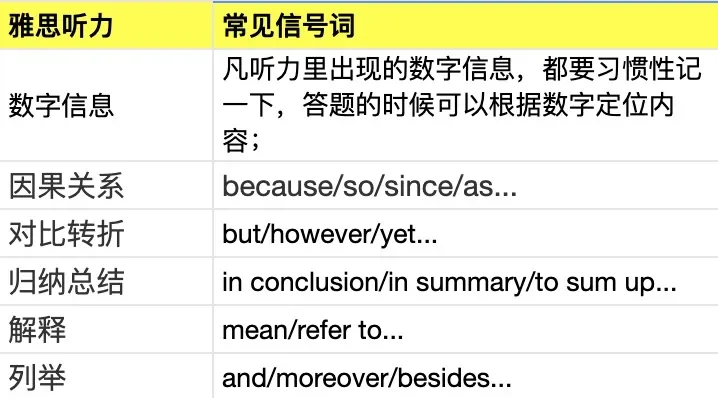
3.How to practice intensive listening?
After all, signal words are not omnipotent. They can help you break through bottlenecks, but they cannot take you from 0 to 1.Improving listening skills still depends on careful listening.
I have improved the traditional five-step intensive listening method by removing the dictation step and reducing the number of loop listenings, retaining only the most essential parts to save training time. I have posted it here for your reference!

Step 1: Listen to the original text, do the questions and check the accuracy;
Step 2: Listen again, take notes, and correct your answers;
It is recommended to listen to it twice first, because sometimes it is not that we cannot understand the main idea of the original text, but that the speaking speed is too fast and we cannot keep up, so we miss the information points.
Step 3: Compare the original text and the translation, and check the wrong questions and the questions you guessed correctly
- Focus on seeing if there are any words or phrases you don’t understand, if so, include them in your vocabulary learning;
- Check if there are any sentences you didn't hear clearly, because the native speaker's expression involves connected reading, omission, voicing, loss of tone, etc. For example, I used to be more accustomed to American accent rather than British accent, which may affect our understanding. If this is the reason, then directly start the single sentence loop until you can hear every word clearly.
Step 4: Continue listening until you hear every sentence clearly and fully understand the exercises
Some friends read the answer and don’t understand why it is this answer, so they skip it. This attitude is not desirable!
Step 5 (optional): Adjust the speed to 1.25 times to see if you can understand it
After the experience of step 4, step 5 is basically no problem. But after training at double speed, you can get an extraordinary sense of pleasure when you listen to the original text again!
II. IELTS Reading
1. ReadingNever enough time?
We have analyzed the difficulties of listening in depth above. Now let’s take a look at reading.
I would say that the most common problem with reading is not having enough time to do the exercises.Giving us 40 minutes and 60 minutes respectively will make a big difference in the final accuracy rate. I used to be frustrated that I could have easily answered the questions correctly but didn't because I didn't have enough time.
same,Let’s think about what causes lack of time?I think it is nothing more than the following two points:
- The article is too long, and it takes a lot of time to read it back and forth several times;
- There are new words and unfamiliar phrases, or long and complex sentences, which slow down the speed of answering questions;
If you don't treat the root cause and just pursue the quantity of questions you answer, then answering 50 questions a day will only bring you a false sense of security.
2. Tips for answering full marks + real exam demonstration
I used to have obsessive-compulsive disorder. When reading, I would force myself to finish the whole article, grasp all the information as much as possible, and finish the exercises at one time. So I once tried to improve my speed reading ability, and I would like to be able to read ten lines at a glance (so naive). Of course, the effect was minimal. After all, the brain has limited capacity, how can it be possible to remember everything it sees?
But do you really need to read every word of the reading before answering the questions? Of course not! Quite the contrary.You should first glance over the question stem, and then read the original text with the questions in mind.Please note that what we are talking about here is the question stem, and does not include the details such as options.
IELTS reading has a characteristic.Most questions only echo part of the original text.Often originalProper nouns and synonyms can be easily matched with original paragraphs and titles.Therefore, you can complete 2/3 of the questions simultaneously during the reading process.
Taking 3 real questions as an example, you can get a clear feel for it!
- Multiple choice questions:The question stem directly says "the first paragraph", so as long as you understand paragraph 1, you can answer the question on the spot.
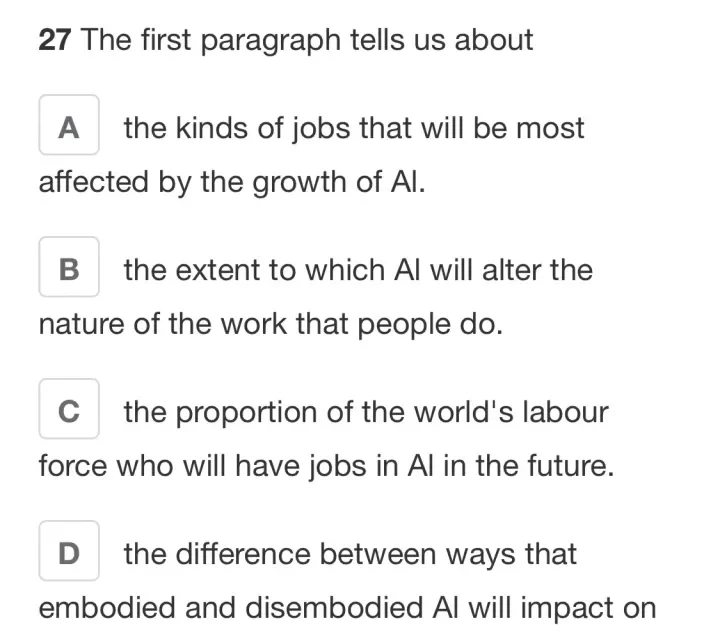
- True/False/Not Given:It seems that we need to read the whole text, but in fact, the order of judgment is consistent with the paragraph order of the original text. We can use the two keywords "build-up fat" (typical behavior) and "Liu" (character) to locate information in the original text.

- Choice of words fill in the blank:This type of question is actually equivalent to the outline of the original text, and naturally follows the storyline. In my opinion, this is the same as the solution to the multiple-choice question, and you can find clues in the original text through the keywords in the question. For example, the keywords here are "1790s" (time) and "print banknotes" (typical behavior). Note that "and" is used to connect 31 and 32, indicating that the two information points are adjacent.
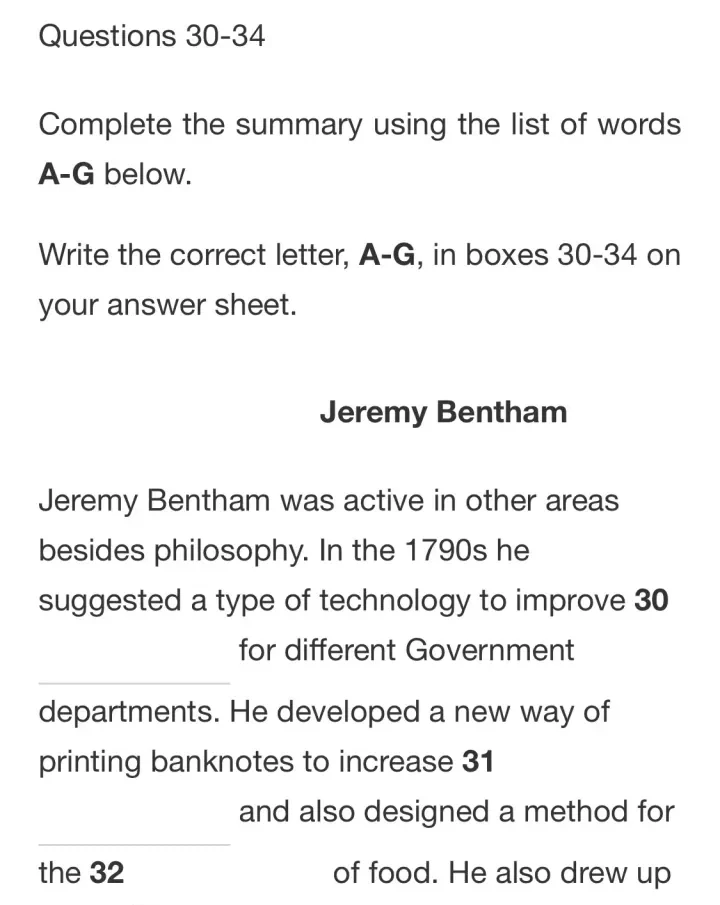
Anyway, in my opinion, these questions are just a different story, and the underlying logic of solving them is the same. You will know once you try!
There are so many useful information, can you please give me a thumbs up?

3. Tackling long and difficult sentences
Long and difficult sentences are definitely a difficult hurdle in reading. Sometimes one sentence is a long paragraph, which is daunting.
Here I have to use a killer book——Written by Teacher Yang PengGRE & GMAT Reading Difficult Sentences TutorialThis book is regarded as a treasure in the GRE/GMAT world. Almost everyone has a copy of it. It has a Douban score of 8.8. Teacher Yang Peng picked out difficult sentences from the real test questions and deconstructed them one by one.

It took me a week to finish reading it, and I had a deeper understanding of the common forms of difficult sentences, such as complex modifications, parentheses, ellipsis, inversion, multiple negation, etc. And my reading improved the fastest in that week, because I really analyzed the long and difficult sentences in each article thoroughly, and broke down the keywords, tenses, syntactic structures and the relationship between sentences clearly.
After training like this,The most intuitive feeling is that the reading speed has been greatly improved.IELTS reading is much simpler than GRE. After reading the difficult sentence tutorial and then going back to do IELTS, you will feel the pleasure of dimensionality reduction. You can understand the main idea of the paragraph at a glance, and you don't have to waste time going back repeatedly.
3. IELTS Speaking
It can be said that the reputation of Chinese students' "dumb English" is well-deserved. I was also tortured by oral English at the beginning. But many ace majors in famous universities still require oral English scores, which once made me so anxious that I broke out in acne.
Later, I also learned from my mistakes and gradually realized the tricks, from the hardcore oral English score of 6.0 to the final score of 7.5, a score I never dared to think about before. So I especially hope that sharing this part can help everyone out of the sea of suffering.
1. The best tool for predicting the topic: oral question bank
There have been various oral question banks circulating in the world, but most of them are old questions that have long been eliminated by the authorities. As we all know, in order to prevent candidates from taking advantage of loopholes,There is a topic change season for IELTS speaking, which is in January (now!), May and September every year.
Usually, the official will replace 1/3 of the questions from the previous quarter and retain the remaining 2/3. Many powerful IELTS teachers have discovered that the new questions from the previous quarter will basically be retained.
In this way, the scope of our exam preparation is greatly narrowed.We only need to focus on preparing for the new questions of the previous quarter and the new questions predicted for this quarter. In this way, there is a 90% probability that we can predict the exam questions.
In fact,The new questions in the two quarters cover almost all types of topics.IELTS speaking is nothing more than talking about life, education, and technology. The vocabulary and phrases used to answer the same topics are the same, and even common sentence patterns can all be compressed onto one page of A4 paper.
In other words, the key to success in IELTS speaking lies in:
- Practice the questions carefully;
- Focus on the topics covered in the questions, accumulate corpus, speak and practice more;
2,Part 1-Part 3 Detailed Explanation
Never underestimate Part 1!
Although Part 1 is simple, we should not take it lightly because it is a great opportunity to impress the examiner!
You may have heard of the halo effect, which states that people will infer other traits of others based on their initial impression of that person. The so-called "judging a book by its cover" and "generalizing from a single example" are all based on this principle.Therefore, if you perform amazingly in Part 1, the examiner will tend to give you high marks in P2 and P3!The idiomatic here does not refer to slang. Slang is regional and is not tested in global exams such as IELTS. Some people may ask what is idiomatic in the oral exam standards? It mainly tests idiomatic expressions and collocations, for example:Appreciate it! I understand it all, except that it is a common expression besides Thank you.
Part 2: Tell the examiner a good story
Part 2 is equivalent to a combined version of Part 1, consisting of multiple small questions, so the core is to tell a good story.
Of course, story materials must be prepared in advance, and you must prepare your own exclusive story library!First, it can avoid conflicts with others. After all, everyone is using the same Baidu, and the high-scoring materials before the search rankings are bound to be similar; second, what we are most familiar with are our own stories, which saves time and effort in remembering them.
What you need to do specifically is to categorize your life experiences into different categories: related to study, socializing, work, travel, hobbies, and covering a limited number of common oral topics.
In addition, there is a little trick taught by the teacher, which isWhen taking Part 2, be sure to take notes! Take 1 minute to write down the key points of the answer. Write down the vocabulary, phrases, and answer outlines you will need to use in your answer. Quickly match the materials you can use in your mind and organize your own story on the spot.In this way, when answering questions, even if you get stuck, it will be very natural to pause and check your notes. It will not affect your fluency and will not deduct points.
Part 3: A template for answering questions that can be adapted to changing circumstances
Part 3 is the real test of your speaking skills. This part is a two-way discussion with the examiner, which will last about 4-5 minutes. There are no shortcuts in this part, and no questions can be predicted. No one knows what questions the examiner will ask. However, following this basic answering procedure in P3 is definitely a plus.
Step 1: Opinion, express your opinion;
Step 2: Reason, explain your point of view;
Step 3: Example, give practical examples to support your point of view;
Step 4: Conclusion, summarize your ideas;
3. What are the pitfalls of IELTS speaking?
I once listened to a former IELTS examiner’s speaking topic sharing, and was surprised to find that many of the highly regarded IELTS speakingPractice methods and test-taking techniquesThey are all wrong! You can check and correct yourself and find the right answer.
Not everyone is suitable for the shadowing method.Especially for beginners with weak basics, if the wrong pronunciation is not corrected in time and the wrong muscle memory is formed as a result, the gain will outweigh the loss.
IELTS speaking focuses on communication, don’t memorize!I know many of my friends are used to writing down their answers like essays, correcting their grammar, and then memorizing them. But you have to know that IELTS examiners are also trained.If they notice you are reciting, they will stop grading.Make sure to maintain a conversational feel during the exam.
It is not advisable to blindly pursue advanced expressions.You can go back and look at the slang table posted earlier, and you will find that those words are very simple. In fact, native speakers rarely use particularly formal academic words in their daily expressions. If you don't believe it, you can look at the subtitles of British and American dramas. In other words,In an oral exam, it is far more important to express your ideas clearly and fluently than to force yourself to use advanced expressions.
Still not giving a thumbs up? (I feel wronged TT

IV. IELTS Writing
I believe that many of my friends are just like me in the past. They find it difficult to write in Chinese. It’s good enough if they can barely write a few hundred words, not to mention writing in English, which is simply a life-threatening task.
Indeed, the commonality between writing and speaking is that on some topics, we don’t even have any ideas, let alone express them in English.We should not only practice expression, but also practice thinking.
1. How easy can Writing 1 be to write?
However, divergent thinking is not very useful in writing, so as long as your insight is good, you can get a good score.

Writing 1 gives you a bar chart, pie chart, flow chart, table, etc., and asks you to describe the information it presents.It can be said that this is the easiest part to break through, because its structure is relatively clear, and you can get high scores by following this logic when writing:
- First, explain what the subject of the chart is.
- Describe the most obvious trends and facts presented in the chart
- Finally, describe the specific situation of each category in the chart
The most important thing is,The words, phrases, and sentence patterns used to describe charts are very fixed, and we can memorize them in advance.For example, the changing trend is nothing more than rising, falling, stable, fluctuating, and at most, you can add adverbs of degree, such as rapid rise, sharp fall... As long as you memorize these two tables thoroughly, you will be able to handle the exam with ease and can come up with any expression at will!
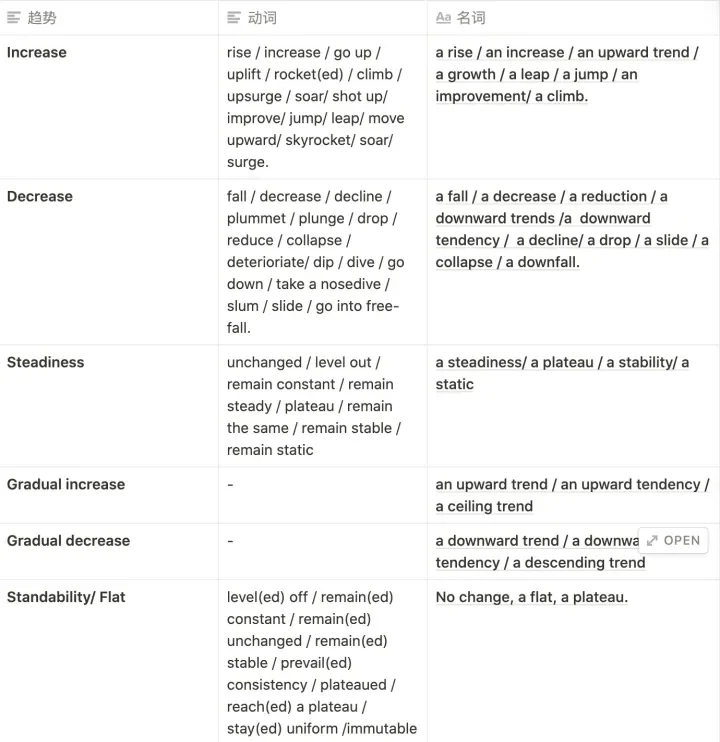
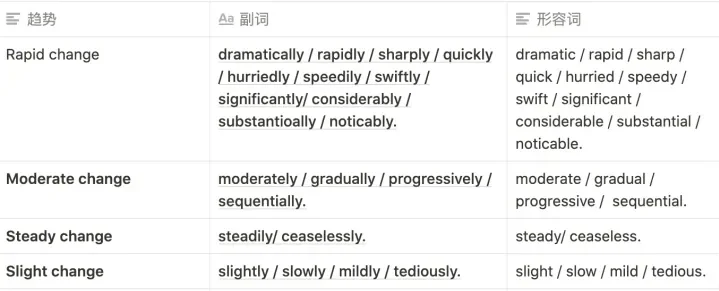
Remember to collect it! Keep it for future use!
2,Thinking Training & Universal Framework for Writing II
Writing 2 is a bit like a speech in a debate competition. For a topic, you need to demonstrate dialectical thinking, list solid arguments, and be logically clear and self-consistent. Therefore, you should deliberately train your thinking ability on weekdays, let the left and right brains compete with each other, and reflexively look at problems from multiple angles, so as not to be empty-headed in the exam room.
For example, if you are given this assignment, what points can you write down?
With the rise in popularity of the internet, newspaper will soon become a thing of the past. To what extent do you agree or disagree?
To be honest, my first reaction was: Nonsense! Newspapers will inevitably become outdated, who reads newspapers now? What advantages do newspapers have over the Internet? Protecting eyesight? Later, I calmed down and thought about it, and reluctantly wrote two advantages of newspapers. For example, for the middle-aged and elderly groups, the learning cost of using computers is very high; in addition, the information in newspapers is more reliable than the rumors in the Internet world.
I suggest you look for past writing exam questions and write down your own opinions in Chinese for each question to see if you have any new ideas. Once you have passed this level, you can then look at how to express it in English.
Writing 2 has a universal framework that can be applied to any topic:
- The three-paragraph structure is adopted: the first paragraph paraphrases the topic in your own words + explains the opposite viewpoint, the second paragraph provides arguments and evidence for viewpoint 1 (positive viewpoint), and the third paragraph provides arguments and evidence for viewpoint 2 (negative viewpoint);
- Use a four-paragraph structure with a general-specific-general structure: on the basis of the three-paragraph structure, add a summary paragraph.
Let me add a comment here: Although I mainly studied on my own throughout the preparation process, I did meet several good IELTS teachers who gave me a lot of help.
Finally, let me summarize:
- The best time to prepare for IELTS is 2-3 months. Spending too much time will exhaust you mentally and physically.
- Through open classes, you can get started with IELTS in 1 week, receive IELTS materials and become familiar with IELTS question types;
- IELTS listening: focus on mastering signal words + practice through the improved five-step intensive listening method;
- IELTS Reading: Master the correct test-taking skills and practice long and difficult sentences;
- IELTS Speaking: Get the speaking question bank of the season, focus on accumulating slang and story materials, memorize answer templates, and avoid pitfalls;
- IELTS Writing: Master the fixed expressions of charts and graphs, train dialectical thinking, and memorize the writing framework.
This article actually took me a whole week to sort out. This is the first time I have tried to share such a long article. Each part is the essence of preparing for IELTS. If you follow the IELTS preparation plan in the article, you will definitely get twice the result with half the effort! I hope it can help you!